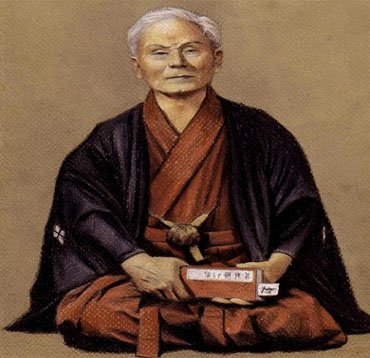
Gichin Funakoshi
Shotokan Karate originated in Okinawa, a small island south of Japan. It was popularized in Japan by Gichin Funakoshi in the 1950s. The name “Shotokan” comes from the name “Shoto” which was Funakoshi’s pen name, meaning ‘waving or billowing pine’. Shotokan Karate is a traditional martial art. This means that improvements in character and mental discipline are as important as physical skill, if not more so.
Shotokan is a modern name given to the style of karate that developed from the Okinawan systems, and which was introduced to Japan in 1922 by Gichin Funakoshi, the father of modern karate. He was born in 1868, and studied karate from his childhood. His love of the art led the Okinawan to teach. Funakoshi first arrived in Japan in 1922, invited by the Japanese Ministry of Education to attend an athletic exhibition. His demonstration of karate was a great success, and while he remained unknown for a few more years, he was befriended by the founder of judo, Jigero Kano. Kano’s help made a great impression on him, and he never forgot his kindness. The respect and courtesy he was shown probably influenced his own teaching and philosophy.
Gichin Funakoshi is widely considered as the “father” of modern day karate.He was born in the Shuri prefecture in Okinawa in 1868 and at the age of 11 began to study Karate under two of Okinawa’s top masters.In time, He became a master in his own right and in 1922 he was invited to demonstrate karate to the Japanese public for the very first time. The demonstration was such a success he was invited to stay in Japan and teach, which he did with great success.
For Sensei Funakoshi, the word ‘karate’ eventually took on a deeper meaning than just martial arts training, transforming into what is has become known as karate-do, the ‘way of the empty hand.’ He was to modify the Okinawan art by taking inspiration from traditional Japanese budo (kendo, judo, etc) and integrated their philosophical aspects into his and his student’s training.
Shotokan Karate is meant to be accessible to all, including, women, children, and those with or without great athletic ability. The Shotokan Karate Academy (SKA) offers a caring, safe environment where children and adults can learn the art of karate.
Gichin Funakoshi (1868 – 1957)
Funakoshi’s (Shotokan) Principals – Principles of Shotokan Karate
1. Never forget: Karate begins and ends with rei. Rei has the meaning of respect.
2. There is no “first hand” in Karate. (Meaning there is no first attack, karate is about self-defence)
3. Karate supports righteousness.
4. First understand yourself, then understand others.
5. The art of mind is more important than the art of technique.
6. The mind needs to be freed.
7. Trouble is born of negligence.
8. Do not think that Karate is only in the dojo.
9. The training of Karate requires a lifetime.
10. Transform everything into Karate; therein lies the exquisiteness.
11. Genuine Karate is like hot water; it cools down if you do not keep heating it.
12. Do not have an idea of winning, while the idea of losing is not necessary.
13. Transform yourself according to the opponent.
14. The outcome of the fight all depends on the manoeuvre.
15. Imagine one’s arms and legs as swords.
16. Once you leave the shelter of home there are a million enemies.
17. Postures are for the beginner, later they are natural positions.
18. Do the kata correctly, the real fight is a different matter.
19. Do not forget the dynamics of power, the elasticity of the body, and the speed of technique.
20. Always be good at the application of everything you have learned.
